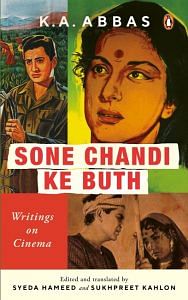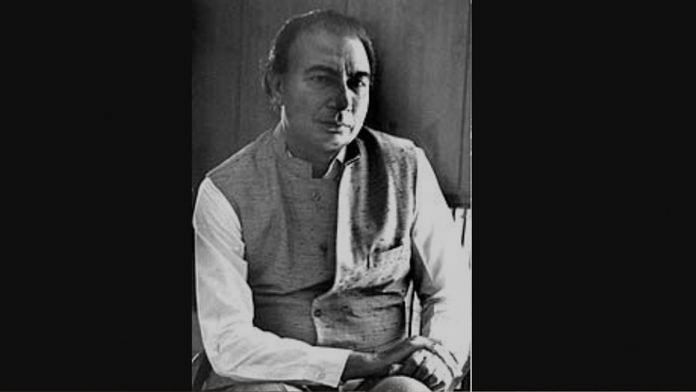Sir Syed Ahmed Khan was the founder of Aligarh Muslim University and the harbinger of many landmark events. He had once said, ‘If Allah asks me, Syed! What did you achieve in this world, my answer will be, “Allah Taa’ala, I got Khwaja Altaf Husain Hali to write his epic poem Musaddas-e-Hali.”’ In a similar vein, one of my writings that had the same import was an open letter I wrote to Sahir Ludhianvi in 1948. Sahir was among others who had left for Pakistan. Although this open letter was addressed to Sahir Sahib, I was calling out to all the progressive writers who had performed Hijr’at to Pakistan in the aftermath of the communal riots. Three months later, I was amazed when I saw Sahir in Bombay. I did not know him well but I admired his poetry, in particular the poem ‘Taj Mahal’.
The open letter was triggered by that. ‘But you had gone away to Pakistan.’ ‘I had . . . but you called me back.’ He told me that when he read my letter in the newspaper, he was in a dilemma—fifty-fifty in favour of returning to India or staying in Pakistan. My open letter tilted the balance in favour of India. So, he came to India and never went back to Pakistan—although there was no scarcity of admirers and lovers of his poetry in that country. In a sense then, the responsibility of calling Sahir to India rested on my shoulders. Inder Raj Anand introduced him to Kardar Sahib and Dr Mahesh Kaul for writing the lyrics for his film Naujawan (1951). So, in his very first film, Sahir created history by introducing Urdu poetry in Hindi cinema. From that moment until his dying day, he never deviated from this track. Whatever he wrote was the artistic expression of a poet. He never allowed any dilution in this standard.
He became immensely popular. This was largely due to the beauty of his language and its power of evoking sensitive expression and imagination. He was at once a lover and beloved of Urdu. Lover because he adored the language and got several of his films certified as ‘Urdu’ by the censor board. He was prepared to suffer, fight and sacrifice for the language. And beloved because Urdu gave him a licence that it had not given to any other poet. In Urdu poetry, no one has experimented as much as Sahir. He wrote about all of life’s faces: political, romantic, psychological. Poetry of the working class, of resistance, poetry of first love, poetry which touched the heights of spiritualism and poetry which was purely tantalizing—all these facets are seen in his film songs. Sahir was the first to give filmi poetry the status of literature; other poets followed his lead. He not only improved the taste of filmgoers but, like a true poet, never looked down upon the calibre of his audience. Else how could songs like ‘Mein pal do pal ka shayar hoon’ and ‘Ke jaise tujhko banaye gaya hai mere liye’ have become as popular as they did!
Sahir means jadugar (magician). When Abdul Hai of Ludhiana adopted the takhallus ‘Sahir’ he created magic. Sahiri and Shayiri became synonymous. They were two sides of the same person. I have watched how Sahir’s magic grips his listeners. Twenty years ago, we went on a tour to Bihar and western UP under the leadership of Sajjad Zaheer. In Allahabad, at the Kanya Vidyalaya, all the girls were Hindi speaking. We thought they may not appreciate Urdu poetry. We asked Sahir to recite first. Sahir did not recite elementary level poetry but presented the best sample of Urdu poetry. The audience was stunned. There was a unanimous request for him to recite his ‘Taj Mahal’. Sahir began with the line ‘Meri mehboob kahin aur mila kar mujhse’ (My beloved, meet me somewhere else). Then he reached the last line, ‘Ek shehanshah ne daulat ka sahara lekar, Hum ghareebon ki mohabbat ka uraya hai mazaaq’ (An emperor using his boundless wealth made mockery of our love, we the poor). The hall resounded with applause. That day, I said to myself that Sahir’s poetry had reached its pinnacle of Sahiri (magic).
Also read: Tagore wrote a letter of introduction for Bose before he left India. Half-hearted at best
Sahir was obsessed with one idea. He wanted to elevate the status of poets within the commercial world of Bombay cinema. No matter how big a film poet was, his name never appeared in the publicity and marketing material. His name was never announced when his songs were played on the radio. He never got decent money for his work; sometimes he got nothing at all! Sahir observed that while music directors and singers were mentioned and applauded, there was no mention of the writer. People knew nothing about poets who had written the words. Sahir considered this attitude to be an insult to the artists. When he was elected vice president of the Film Writers Association (I was president), he accepted the offer on one condition—that the two of us would campaign together for the rights of the poets. We began with the radio. Sahir and I went to Delhi to meet the director general (DG) of All India Radio. We asked, ‘You announce the singer’s name with every song you play, why do you ignore the poet?’ The DG replied, ‘We don’t have enough time.’ Sahir retorted, ‘What about the time spent announcing the names of those who send requests?’ The DG was finally convinced, and an order was issued that the name of the poet would be announced with every song. As recognition of this achievement, Sahir was elected president of Film Writers’ Association.
 This excerpt from KA Abbas’ ‘Sone Chandi Ke Buth: Writings on Cinema’, edited and translated by Syeda Hameed and Sukhpreet Kahlon, has been published with permission from Penguin Random House India.
This excerpt from KA Abbas’ ‘Sone Chandi Ke Buth: Writings on Cinema’, edited and translated by Syeda Hameed and Sukhpreet Kahlon, has been published with permission from Penguin Random House India.



